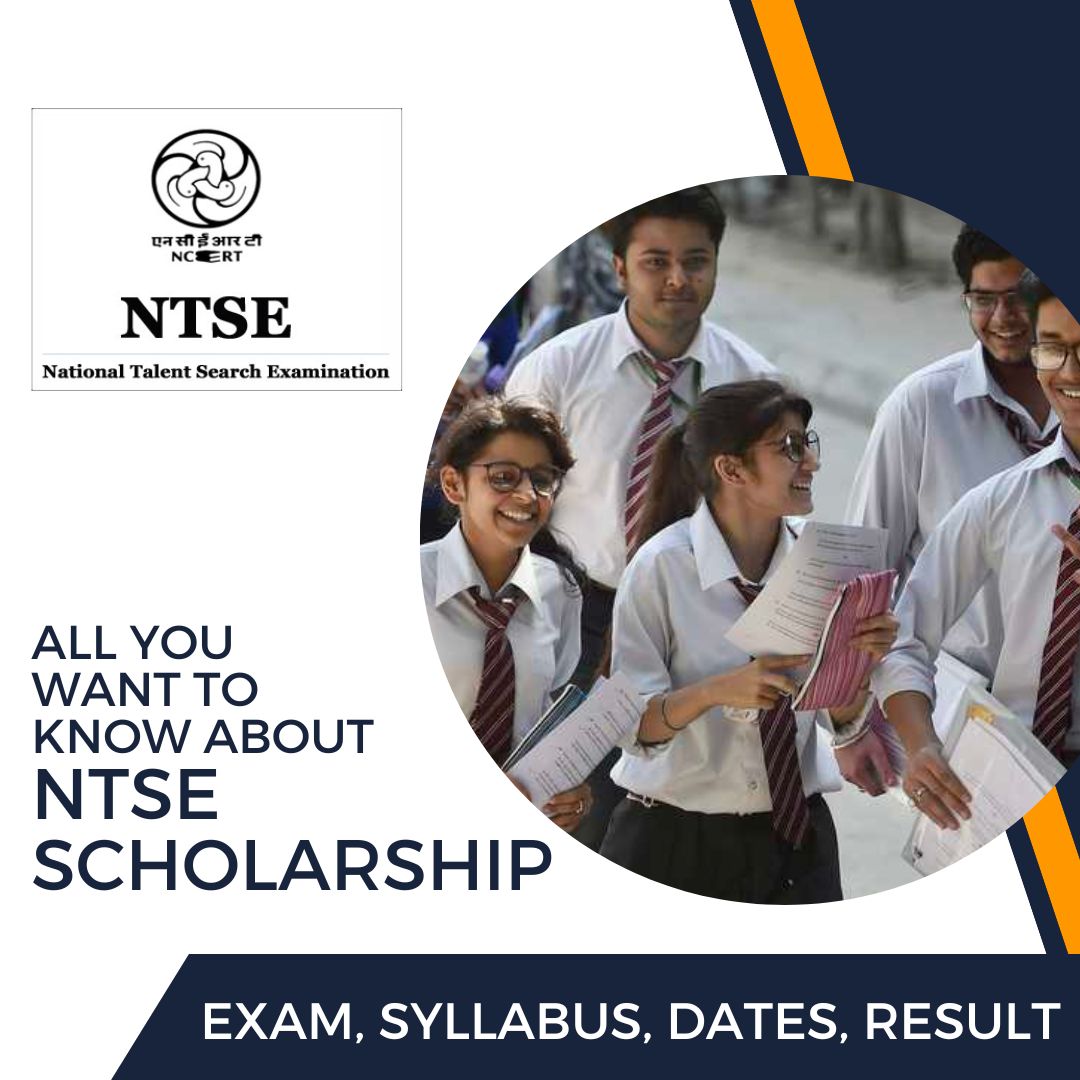All you want to know about NTSE Scholarship Exam date, Syllabus, Preparation Tips
The National Talent Search Examination or NTSE scholarship exam is a prestigious program in India that recognizes and supports exceptional young talent. Administered by the National Council of Educational Research and Training (NCERT), this scholarship scheme has been a stepping stone for countless students to pursue their dreams in higher education. In this article, we’ll discuss the details of the NTSE scholarship, its importance, and how it opens doors to a world of opportunities.
What is the NTSE Scholarship?
The NTSE scholarship is a national-level examination conducted by Govt. of India to identify and nurture talented students. It aims to provide financial support to meritorious students to encourage them to pursue higher education and excel academically. It is not only a scholarship exam but an honor for every student to be the talent of the nation. This examination is conducted every year. Although the students who are currently in 10th class are eligible for NTSE scholarship exams but those who are more concerned starts there preparation from class 9th or even class 8th.
The NTSE Selection Process
The NTSE scholarship program operates in two stages:
Stage 1: The first stage is a state-level examination, conducted by the respective State/UT education boards. Students from Class X can appear for this stage. It includes two papers: the Mental Ability Test (MAT) and the Scholastic Aptitude Test (SAT). Successful candidates from this stage qualify for the National level NTSE exam.
Stage 2: The National level examination, administered by the NCERT, is the second stage. It consists of MAT, SAT, and a Language Test. The language test is of qualifying nature and is not considered in the final merit list. Students who clear this stage become eligible for the prestigious NTSE scholarship
Eligibility Criteria for NTSE Exams
The National Talent Search Examination (NTSE) scholarship is open to Indian students who are pursuing education in India. Here are the eligibility criteria for availing the NTSE scholarship:
Student’s Class:
Students who are currently studying in Class X in recognized schools are eligible to appear for the NTSE examination. The examination typically takes place in two stages, with the first stage conducted at the state or Union Territory (UT) level and the second stage at the national level.
Indian Citizenship:
The student must be an Indian citizen. Students who are Indian nationals studying abroad can also appear directly for the NTSE Stage II examination, but they must secure at least 60% marks in their Class IX examination to be eligible.
Minimum Marks:
There is no specific minimum percentage required at the state level for appearing in the NTSE Stage I examination. However, students are expected to maintain a good academic record. To qualify for the national level (Stage II) examination, students generally need to score at least the cutoff marks specified by their respective states/UTs.
It’s important to note that each state and Union Territory may have its own eligibility criteria and selection process for the first stage (Stage I) of the NTSE examination. Students should check with their respective state or UT’s education department or official NTSE website for specific details regarding the eligibility criteria and examination dates.
Once a student qualifies for the national level (Stage II) of the NTSE examination, they become eligible for the prestigious NTSE scholarship, which includes financial assistance for their higher education.
NTSE Scholarship Exam Date 2023
Below, you will find a table outlining the potential examination timetable for the NTSE Scholarship in 2023 Usually the stage I process starts in the month of Sep. :
| Events | Stage I Dates | Stage II Dates |
| Application form releases | October 2023 | – |
| NTSE Admit Card release date | November 2023 | Third week of May 2024 |
| NTSE Exam date | December 2023 | June 2024 |
| NTSE Result | January-March 2024 | October 2024 |
NTSE Scholarship Exam Pattern 2023
NTSE Scholarship exam is conducted at two stages- Stage 1 & Stage 2. Aspirants should have proper knowledge of Exam Patterns to prepare efficiently for the exam. The exam pattern for NTSE Scholarship 2023 is mentioned in the table below:
| Paper Name | Test Name | Number of Questions | Total Marks | Exam Duration (in minutes) |
| 1. | Mental Ability Test (MAT) | 100 | 100 | 120 |
| 2. | Scholastic Aptitude Test (SAT) (Science, Social Science, Maths) | 100 | 100 | 120 |
NTSE Scholarship Detailed Exam Pattern 2023
Stage I
- A state and union territory level test will be stage I.
- The stage exam will take place via offline mode.
- The Stage 1 exam will consist of two papers, Paper 1 and Paper 2, which will assess applicants’ mental and academic abilities respectively. There will be a total of 200 questions, each worth one mark (a total of 200 marks).
- There is no negative marking for the Stage I exam.
Stage II
- The NTSE Stage II exam will be organized at the national level conducted by NCERT.
- Stage II will be conducted offline.
- Paper 1 and Paper 2 are the two papers that will be covered in the Stage II test. Paper 1 will assess candidates’ mental abilities, while Paper 2 will measure their academic abilities.
- There will be 200 questions altogether, at 1 point each (200 marks on both papers 1 and 2).
- There is no negative marking in the NTSE Stage II exam.
NTSE Scholarship 2023 – Detailed Syllabus
| Sections | Topics |
| Verbal Reasoning |
|
| Non-Verbal Reasoning |
|
| SAT Science Syllabus (Biology, Physics, Chemistry) |
|
| SAT Social Science Syllabus |
|
| SAT Maths Syllabus |
|
What happens when you clear NTSE Scholarship
- Financial Support: One of the primary benefits of the NTSE scholarship is the financial assistance it provides to deserving students. It covers their educational expenses, making it easier for them to pursue higher studies.
- Recognition and Prestige: Being an NTSE scholar is a significant achievement and a matter of prestige. It opens doors to various opportunities, including access to top educational institutions and a competitive edge in future academic pursuits.
- Holistic Development: The NTSE scholarship doesn’t merely focus on academics. It encourages all-round development by testing students’ mental ability, scholastic aptitude, and language skills.
- National Exposure: The National level examination brings students into a competitive environment, providing them with a taste of the challenges they might face in the future. It’s a valuable experience that prepares them for higher-level competitions.
- A Pathway to Career Opportunities: Many NTSE scholars have gone on to excel in diverse fields, including science, technology, medicine, civil services, and more. The scholarship often paves the way for fulfilling careers.
How to crack NTSE Scholarship, some Tips and Tricks
- Start early: The preparation for NTSE should begins in Class IX it self, and consistency is key. You should devote at least 3 Hrs. of time each day for NTSE preparation.
- Refer to official NCERT textbooks: These are crucial for both stages of the exam. you should understand the syllabus by going through the important topics. The NCERT books provide the basic understanding of the topics.
- Solve sample papers: You should solve the sample papers as well as previous years’ question papers. They help a lot in understanding the nature of questions which are asked in the exam. You can also take some mock tests from online series or any coaching institute and test your preparedness on regular basis. It also keeps you updated about the latest exam patterns.
- Make a time table: You preparation is not complete if you don’t make a time table. As described earlier that consistency is the key so you have to make a proper time table and divide your syllabus accordingly. Devote time to each subject and cover it in a stipulated time frame so that you can cover the entire syllabus well before the actual exam. Daily you should devote fixed hrs. to each subject.
- Focus on time management: Monitor the time in solving the questions. That way you can solve all the question well before the stipulated time during exam and score the best marks. during the exam.
- Stay updated: Stay abreast with current affairs and general knowledge.
- Eat Healthy: Student should eat healthy during preparation of the exam as eating healthy during studies would keep them healthy. Only a healthy body can keep a healthy mind which is the first condition to be successful. You diet should have proper nutrients.
- Take breaks : You should keep taking short breaks while studying. The ideal way to take break is to study for 20 minutes continuously and take a one minute break. During this break you can stand up from the chair and take a short walk. This way you can sit for longer hours and maintain your consistency.
Revised Scholarships Rewards
The NTSE scholarship rewards are revised from Year 2014-15. According to NCERT Site now for class XI and XII candidate would get Rs. 1250/- per month as scholarship. For under graduate course this amount is Rs. 2000/- per month. Where as this amount for PhD and other programs is as per UGC norms. But as said earlier this is not just a financial reward; it’s a recognition of a student’s potential and talent. It serves as a launching pad for higher education and future accomplishments.
By excelling in the NTSE, students not only secure their academic future but also embark on a journey of personal and intellectual growth. It’s a testament to the fact that India’s youth are its most valuable resource, and nurturing their talent is an investment in the country’s future success.
More details
You can get more details at this NCERT site.
More career guidance is available at this page

